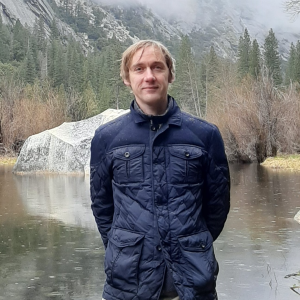Recipients of the Lynn and Maude White Fellowship
2024-2025
Greg Sattler (History)
 Greg’s dissertation, Chinese Merchants, Officials, and Diaspora Communities in the History of Maritime Asia, from the Eighth to Thirteenth Century CE, provides insight into past patterns of human mobility, organization, interaction, and cooperation, with a particular focus on Chinese sea merchant networks and the overseas communities that they established. His project considers the lives of these individuals, the ethnically diverse communities that they belonged to, and the reasons they traveled to and from locations in East Asia, Southeast Asia, India, and the Persian Gulf.
Greg’s dissertation, Chinese Merchants, Officials, and Diaspora Communities in the History of Maritime Asia, from the Eighth to Thirteenth Century CE, provides insight into past patterns of human mobility, organization, interaction, and cooperation, with a particular focus on Chinese sea merchant networks and the overseas communities that they established. His project considers the lives of these individuals, the ethnically diverse communities that they belonged to, and the reasons they traveled to and from locations in East Asia, Southeast Asia, India, and the Persian Gulf.
2022-2023
Robin Kello (English)
 Robin’s dissertation examines representations of forced migration in the works of Shakespeare and other early modern dramatists and the plays in contemporary performance. Focusing on the figure of the refugee in theater, this project draws out the connections between textual readings informed by histories of early modern displacement and case studies of twenty-first century productions that exploit the potential of canonical drama to produce a theater commensurate to the moment. As a sustained project of activist scholarship, Robin’s study is both an analysis of and an argument for a theater that engages critically with forced migration as war, economic inequity, global climate change, geopolitical instability, and an increasingly militarized border regime suggest that forced migration and the goal of justice for refugees will remain crucial issues in the twenty-first century.
Robin’s dissertation examines representations of forced migration in the works of Shakespeare and other early modern dramatists and the plays in contemporary performance. Focusing on the figure of the refugee in theater, this project draws out the connections between textual readings informed by histories of early modern displacement and case studies of twenty-first century productions that exploit the potential of canonical drama to produce a theater commensurate to the moment. As a sustained project of activist scholarship, Robin’s study is both an analysis of and an argument for a theater that engages critically with forced migration as war, economic inequity, global climate change, geopolitical instability, and an increasingly militarized border regime suggest that forced migration and the goal of justice for refugees will remain crucial issues in the twenty-first century.
2021-22
Misho Ishikawa (English)
 Misho’s dissertation considers the world-changing reverberations of the Mongol Yuan dynasty (1271-1368) through transformations of body and self in medieval contact literatures. By comparing texts from two remote poles (England and Japan) with texts produced from within Yuan China, she examines how the feeling body emerged as a principal border of Mongol imperialism in the thirteenth and fourteenth centuries. Through this diverse archive she traces how macrocosmic change is persistently encountered, interpolated, and comprehended through microcosmic attention to the senses as world-building mechanisms. Advocating then for an approach to medieval globality predicated on intimacy, Misho’s work attempts to explain how processes of sense acquisition make cognizant both “self” and world in light of new forms of global power relations.
Misho’s dissertation considers the world-changing reverberations of the Mongol Yuan dynasty (1271-1368) through transformations of body and self in medieval contact literatures. By comparing texts from two remote poles (England and Japan) with texts produced from within Yuan China, she examines how the feeling body emerged as a principal border of Mongol imperialism in the thirteenth and fourteenth centuries. Through this diverse archive she traces how macrocosmic change is persistently encountered, interpolated, and comprehended through microcosmic attention to the senses as world-building mechanisms. Advocating then for an approach to medieval globality predicated on intimacy, Misho’s work attempts to explain how processes of sense acquisition make cognizant both “self” and world in light of new forms of global power relations.
2020-21
David Bardeen (Art History)
 David’s dissertation investigates the making and use of Italian intarsia, a wood inlay technology that furnished some of Italy’s most important religious and secular spaces during the late-fifteenth and early-sixteenth centuries. Working closely with painters, architects and other craftsmen, the makers of intarsia created illusionistic pictures of landscape views, still lifes and saints and other religious figures in ways that suggest an interest not only in the pictorial design of intarsia panels but also in the biological and ecological properties of wood and its capacity for material transformation. The project examines how this practice of designing from wood may have provoked new ways of thinking about forests, trees, and the Italian landscape, at a time when the human relationship to the natural world was the subject of intense scrutiny in artistic, philosophical and spiritual discourses.
David’s dissertation investigates the making and use of Italian intarsia, a wood inlay technology that furnished some of Italy’s most important religious and secular spaces during the late-fifteenth and early-sixteenth centuries. Working closely with painters, architects and other craftsmen, the makers of intarsia created illusionistic pictures of landscape views, still lifes and saints and other religious figures in ways that suggest an interest not only in the pictorial design of intarsia panels but also in the biological and ecological properties of wood and its capacity for material transformation. The project examines how this practice of designing from wood may have provoked new ways of thinking about forests, trees, and the Italian landscape, at a time when the human relationship to the natural world was the subject of intense scrutiny in artistic, philosophical and spiritual discourses.
2019-20
Gina Lorenz (French & Francophone Studies)
 Ms. Lorenz’s dissertation, “Humanizing the Clash: Cultures of Connection in the Medieval Mediterranean,” compares descriptions of cultural encounters and everyday lived experience in first-person narratives, in the original French and Arabic, written during the twelfth through fourteenth centuries. Taking the “clash of civilizations” and the Crusades as point of departure, she focuses on what she deems the “micro”: embodied interfaith interactions as recounted through personal observations, anecdotes, and stories. By doing so, she highlights the interrelatedness of conflict and exchange and seeks to counter reductive East/West binaries that are often einforced by macro, event-driven histories.
Ms. Lorenz’s dissertation, “Humanizing the Clash: Cultures of Connection in the Medieval Mediterranean,” compares descriptions of cultural encounters and everyday lived experience in first-person narratives, in the original French and Arabic, written during the twelfth through fourteenth centuries. Taking the “clash of civilizations” and the Crusades as point of departure, she focuses on what she deems the “micro”: embodied interfaith interactions as recounted through personal observations, anecdotes, and stories. By doing so, she highlights the interrelatedness of conflict and exchange and seeks to counter reductive East/West binaries that are often einforced by macro, event-driven histories.
2018-19
Franka Horvat (Art History)
Insular Networks in the Middle Ages: The Art and Architecture of the Elaphiti Islands, Croatia
2016-17
Elizabeth Comuzzi (History)
The Economy and Economic Connections of Puigcerdà, 1260-1360
2014-15
Melinda LaTour O’Brien (Musicology)
Music and Moral Repair in Early Modern France (2016)
2012-13
Brittany Asaro (Italian)
The Unseen Beloved: Love by Hearsay in Medieval and Early Modern Italian Literature (2013)
2010-11
Aaron Moreno (History)
Arabicizing, Provileges, and Liturgy in Medieval Castilian Toledo: The Problems and Mutations of Mozarab Identification, 1085-1436 (2012)
2008-09
Leanne Good (History)
Land and Landscape: The Transition from Agilofing to Carolingian Bavaria (2012)
2006-07
Joshua Blander (Philosophy)
Dependence, Seperability, and Theories of Identity and Distinction in Late Medieval Philosophy: Case Studies from Scotus and Ockham (2014)
2004-05
Celine Dauverd (History)
Mediterranean Symbiotic Empire: The Genoese Trade Diaspora in Spanish Naples, 1460-1640 (2007)
2002-03
Edna Yahil (History)
Creating Justice in Late Medieval France: The Seigneurial Court of Saint Germain des Prés (2004)
2000-01
Kirsten Lee Over (Comparative Literature)
Kingship, Conquest, and Patria: Literary and Cultural Identities in Medieval French and Welsh Arthurian Romance (2002)
1999-2000
Courtney Booker (History)
Writing a Wrong: The Divestiture of Louis the Pious (833) and the Decline of the Carolingians (2002)
1998-99
Robert Romanchuk (Slavic Languages and Literatures)
The Textual Community of the Kirillo-Belozerskii Monastery, 1397-1492 (1999)
1997-98
Deborah Meister (English)
The Burning Bush: Tudor Martyrs and the Construction of Subjectivity in the Renaissance (1999)
1996-97
Matthew Vester (History)
Territorial Politics in the Savoyard Domains, 1536-1580 (1997)
1994-95
Angelique Gulermovich Epstein (Folklore and Mythology)
War Goddess: The Morrigan and Her German0-Celtic Counterparts (1998)
1992-93
Victoria Hayne (English)
Performing Social Practice: Theatrical Representation of Social Convention and Conflict in Tudor-Stuart Drama (1997)
1990-91
Aaron Michael Wintroub (History)
To Triumph in Paradise: The New World and the New Learning in the Royal Entry Festival ofhenri II, Rouen, 1530 (1995)
1988-89
Terry Nixon (History)
The Role of Audience in the Development of French vernacular Literature in the Twelfth and Early Thirteenth Century, with a Descriptive Catalogue of Manuscripts (1989)

